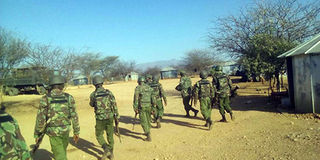Terrorism remains Kenya's top security threat

Anti-Stock Theft Unit officers search for bandits at Kainuk, at the border of Turkana and West Pokot counties, on January 15, 2017. PHOTO | FILE | NATION MEDIA GROUP
What you need to know:
- Al-Shabaab remains an existential threat and has lately been focusing its activities at the Coast and in the northern frontier districts.
- The Rural Border Patrol Unit has been renamed the Border Police Unit, and its strength will be doubled to 6,000 officers.
By all accounts, 2017 was a period of intense electioneering, amid rising ethnic and political tensions.
But while the country went through these security threats and remained largely stable, the everyday threats to Kenya’s national security and development remain alive.
During an induction workshop for newly-elected MPs in September 2017, National Intelligence Service (NIS) Deputy Assistant Director Alexander Muteshi noted that terrorism poses the greatest threat to the country.
“What makes the threats dangerous is that they target churches, malls, schools and other public places. But the success against this is the multi-agency approach we have adopted to deal with them,” Mr Muteshi said.
The threats, he said, are carried out by terrorist organisations like Al-Shabaab, which has cells in neighbouring Somalia, and the Islamic State, which operates in Puntland, Libya, Syria and Iraq.
GROWTH
While the country has gone through a relatively quiet period since the May Mandera quarry attacks targeting the non-locals, Al-Shabaab remains an existential threat and has lately been focusing its activities at the Coast and in the northern frontier districts.
Therefore, even as President Uhuru Kenyatta launched the transformation path for the National Police Service, the threat of terrorism, among other security challenges, was alive in the minds of the officials gathered at the Kenya School of Government, where the 2018 National Security Conference is taking place.
“You will agree with me (that) security underpins any nation’s ability to achieve sustained social and economic development,” President Kenyatta said as he launched the conference on Thursday.
BANDITRY
Security analyst George Musamali says that besides Shabaab, “which has been with us for quite some time now”, the other challenges — the country's porous borders and banditry.
The two factors featured prominently in the president's speech. Under the reforms, the Deputy Inspector-General, Administration Police Service (APS) “will focus on protective and border Security, as well as combating cattle rusting and banditry”, the president said.
Also, the Rural Border Patrol Unit has been renamed the Border Police Unit, and its strength will be doubled to 6,000 officers.





